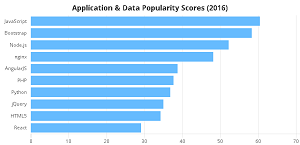News
JavaScript Named 'Application and Data Tool of the Year'
- By David Ramel
- January 12, 2017
StackShare Inc., which runs a developer-only community that tracks software tools, has named JavaScript the "Application & Data Tool of the Year" for 2016, along with many other awards such as best DevOps tool, best tech stack and even best developer.
To provide guidance for the tools that should be on developers' radars for 2017, the site collected reams of data from site visitors and members, including votes, favorites and pageviews. The site continually crowdsources its data by offering visitors an opportunity to share the information about the tech stacks they use, and puts out annual rankings of the top tools based on a multi-faceted ranking methodology.
"It took a bit of time to comb through the data, but there are some killer insights in here," the company said in a "Top 50 Developer Tools of 2016" blog post last week. "To piece this list together, we aggregated usage from 40K+ tech stacks, over a million unique visits, and thousands of developer comments, reviews, and votes across all of 2016 (more on methodology below). Through it, we found some of the top tech trends coming into 2017 and what should be on your bucket list."
No. 1 on that bucket list is JavaScript, the once-lowly, oft-maligned Web scripting language that as of late has morphed into a go-to tool that's now used for even native mobile app development.
"The age of JavaScript has come," the company said. "It's been a few years in the making, but 2016 has solidified the once what-jQuery-runs-on language into the most popular language today. There's been a huge shift towards front-end frameworks (like React and Angular) combined with Node's scalability on the back-end. Of course, the price of JavaScript comes with the hundreds of dev tools needed to launch a simple 'Hello World' app."
What's not mentioned there, of course, is the new uses JavaScript has been put to, such as React Native, a React Web offshoot that was retuned by originator Facebook -- and subsequently open sourced -- for the development of native iOS and Android apps. React Native, often incorrectly characterized as a cross-platform tool, actually provides a "learn once, write everywhere" philosophy, instead of the "write once, run everywhere" motto of cross-platform tools -- meaning those who master it can develop, say, an iOS app and then quickly pivot to develop a separate Android app using the same approach and similar tooling.
Also not mentioned are other new-age offshoots of JavaScript, such as NativeScript, from Progress, which is used for cross-platform native app development.
While those tools weren't mentioned, there's a definite JavaScript flavor to several of the other tools rounding out the top 10 application and data tools, which are:
- Bootstrap
- Node.js
- nginx
- AngularJS
- PHP
- Python
- jQuery
- HTML5
- React
Here's how they ranked in relative popularity scoring:
 [Click on image for larger view.]
JavaScript (Almost) All the Way Down (source: StackShare)
[Click on image for larger view.]
JavaScript (Almost) All the Way Down (source: StackShare)
"2016 was the year of the front-end, and on the front-end, JavaScript reigns supreme," StackShare said. "6 of the top 10 application & data tools live on the front-end, with 5 of those being JavaScript-based. Data tools didn't quite make the cut, with MySQL sitting at #11 followed by MongoDB and Redis. If you're looking at new tools to consider for 2017, you'd be in good company brushing up on your JavaScript skills by picking up either Angular 2 or React."
In addition to the data and application category, StackShare provided top 10 lists for seven others. Here are the No. 1 award winners in those remaining StackShare categories:
| Category |
Winner |
| Utility Tool of the Year |
Google Analytics |
| DevOps Tool of the Year |
GitHub |
| Business Tool of the Year |
Slack |
| New Tool of the Year |
SendBird |
| Top 10 Stacks |
Airbnb |
| Top 10 Developers |
Ryan Townsend, CTO, Shift Commerce |
| Newsletters You Should Be Reading |
JavaScript Weekly |
"Coming into 2017, macro trends like microservices, JavaScript growth, API development, and containerization have fueled a whole network of tools to consider for your next project," the company concluded. "As always, we urge you to consider not just the tool, but the problem that the tool is solving. And 2017 will have plenty of problems to solve, so keep your eyes open for new tools to make your life easier and your projects succeed!"
About the Author
David Ramel is an editor and writer at Converge 360.